WOMEN
IN THE EUROPEAN PARLIAMENT
International Women’s Day 8 March 2024
EQUALITY, INCLUSION AND DIVERSITY UNIT
PART 2 - ADMINISTRATIVE POSTS
A word from the Secretary-General
As Secretary-General, I am committed to making this House a better, more attractive and more inclusive place of work for all colleagues. International Women's Day is an opportunity to look at our achievements in the area of gender equality.
Gender mainstreaming is a priority in our administrative policies and I am pleased to see that we are already reaping results. Indeed, the percentage of women Heads of Unit increased and currently stands at 47%. Furthermore, we have maintained gender parity at Director level. At Director-General level, the current representation of women stands at 29% but will increase to 36% in June when the new Director-General for Personnel takes up her functions. We will then be very close to achieving the 40% target set by the Bureau. Moreover, during the last three years, we have successfully implemented the current Gender Action Plan and the related roadmap. By doing so, we adopt a gender perspective in all Parliament's administrative activities, at all levels and all stages. Last October, the Committee on Women's Rights and Gender Equality held its fourth Gender Equality Week. I am glad that it has become a recurring annual event of the European Parliament, and the Administration stands ready to provide any support needed for these important and necessary discussions. Gender balance fosters both gender equality and organisational performance. It makes our workplace more attractive and secures equal opportunities for every current and future staff member. I am proud that the European Parliament has always led by example and I wish to praise the work done on furthering these objectives.

Alessandro Chiocchetti
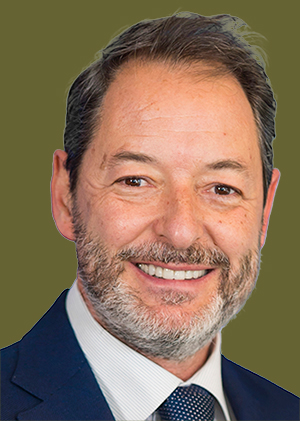
HIGH-LEVEL GROUP ON GENDER EQUALITY AND DIVERSITY

Kristian Knudsen
Director-General for Personnel
As this will be the last time I have the honour of contributing to this brochure before my retirement, and with the end of the parliamentary term in sight, it is time to take stock of our achievements in terms of gender equality in recent years.
Firstly, the much-improved gender balance at management level. We have not quite reached our targets for women heads of unit (47%; target 50%) and directors-general (29%, but will be 36% at the end of the term; target 40%), but we are progressing and have reached parity at director level. This is a great achievement. But we cannot stop here. I believe the next target must be gender parity at all management levels. Secondly, in the 2020 Gender Action Plan and accompanying roadmap we were able, for the first time, to include gender equality measures on both the administrative and political sides. These included enhancing the role and improving the cooperation of key structures in charge of vertical and horizontal representation at the political level. This was a great step forward for Parliament and we should continue combining our political and administrative forces.
Even if we have achieved much in terms of gender equality in recent years, each and every one of us can always do more. It is important to remember that we can all make a difference. We should not just wait for structures to be adapted, which, in an administration such as ours, always takes some time. We can all support gender equality in our daily actions.
In a political institution like ours, changes always start at the political level. The most important way to foster change in gender equality at political level is to make use of your right to vote. In the European elections, you will have the opportunity to make your voice heard and choose a more gender-balanced Parliament. All big changes start small. Vote and make a difference!
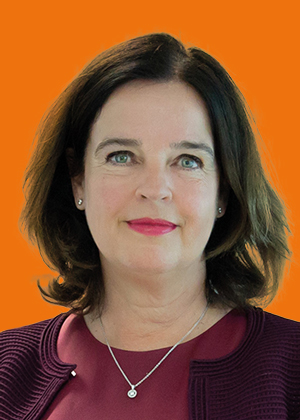
Erika Landi
Director for HR Support and Social Services, DG PERSDirector for HR Support and Social Services, DG PERS
The EP cares about all employees’ health and well-being.
Challenges that people encounter in the workplace may differ depending on age, gender, ethnic background, sexual orientation, disability, etc. An intersectional approach allows us to better understand not only these different characteristics but also their multiple combinations. Being aware of this allows us to better adapt our working environment to individual needs, and thus improve well-being at work. This in turn contributes to the EP being an attractive employer.
Overcoming challenges develops many skills. That is why our institution will gain so much by becoming a more diverse employer. Recently, I met with parents, and single parents, of children with disabilities and I was impressed with how they organise their working lives and meet the needs of their children.
I learned that for them, an inclusive workplace in particular has to offer flexibility. Our Parliament already has some important tools in this respect, such as reduced working time, parental leave and, in our new teleworking rules, the possibility to adapt the teleworking scheme. This is great progress, because it enables full-time work as much as possible while providing the flexibility to cope with or even thrive in the various life situations our colleagues may encounter. Further progress is still needed, particularly in terms of raising awareness among managers, communication and information on available measures and simplifying administrative procedures.
Sanna Lepola, Leena Maria Linnus, Agnieszka Walter-Drop and María José Martínez Iglesias, Directors-General
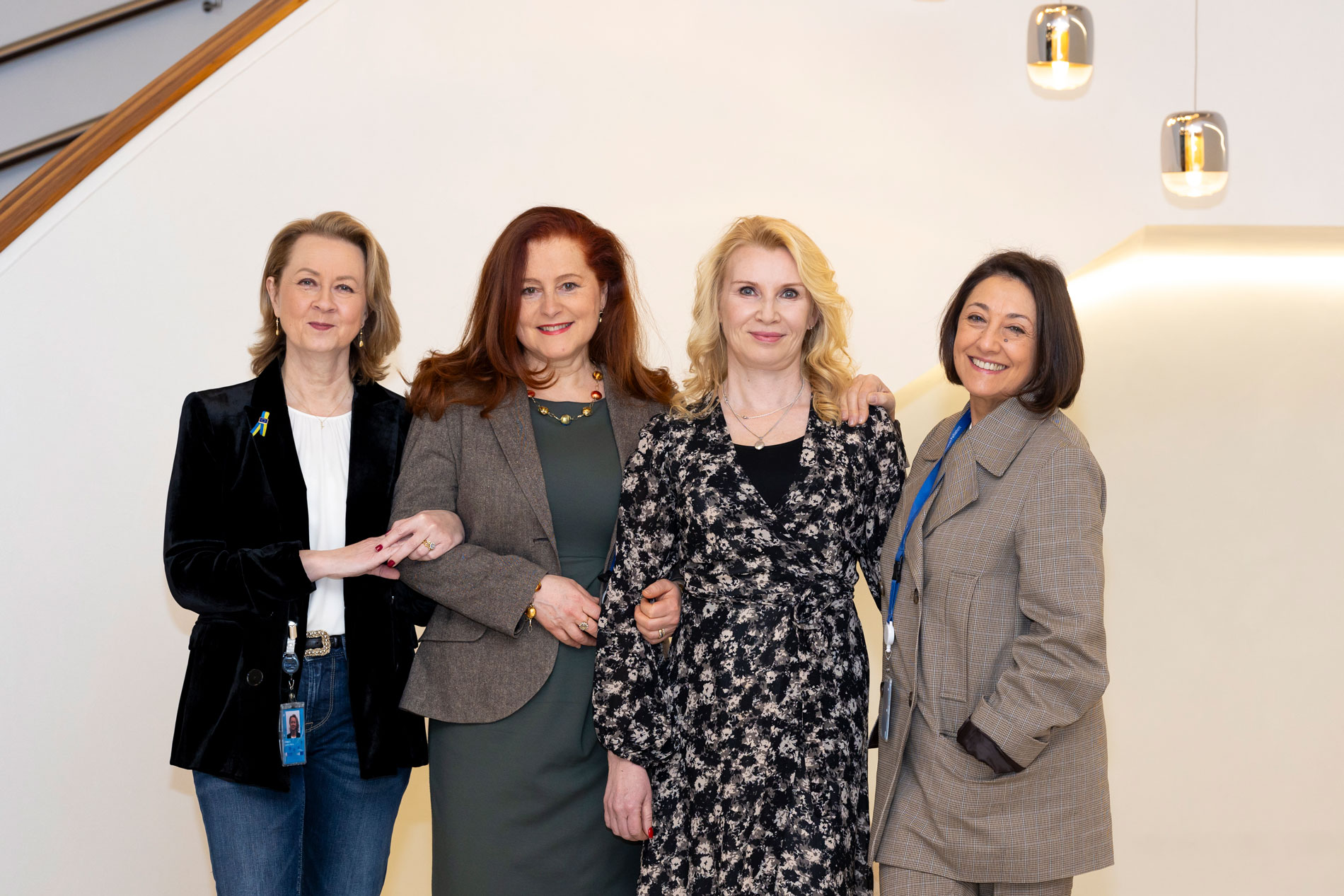
Gender equality at our Parliament has undeniably come a long way. When we reflect back on the start of our careers, the leap we have taken as an institution and as societies is gargantuan. This year's brochure highlights the targets that have been reached and the broad gender balance that now exists in our institution. However, we cannot say that gender equality has been reached or take this presumed equality for granted. The figures may suggest that equality is there, but we know that the reality is more complex. Across our societies and workplaces, we still see a high segregation of responsibilities, the continued staying power of gender roles and policies that, while well-meaning, push women into the traditional gender stereotypes. It raises the question of how we ensure equal opportunities for all in our workplaces.
How do we develop a culture where women can create their own destinies; feel safe to step up and take the lead when they wish; are able to strive to obtain the roles and careers that they desire free from social assumptions or pressures? And that this is accepted and supported by men? We all must engage in achieving such a culture in our organisation and in our communities. To produce a true cultural shift, women have to take action, they must assert their desires and build their futures by and for themselves. But while women can do a lot, they cannot do it alone.
True equality is not just about numbers, and not just for women. It applies to every moment of every day, in every area of our lives. Within the workplace it is not just about quotas, recruitment or retention, it is also about how we treat one another and how we shape our culture together. Equality is not just an added layer; it is part of everything we do at work and outside.
We see ourselves not merely as examples of how women can succeed in our institution. As Directors-General, we are first decision-makers, responsible for many of the key policies and structures that keep the Parliament operational and functioning. We control and decide upon a large share of Parliament’s budget. We make crucial decisions on strategies and recruitment, on objectives and their implementation, on our institutional culture. We build teams, ensuring we find skilled women and men colleagues, supporting them, encouraging them, and providing them with them an environment to grow and succeed in.
For the Parliament, unique challenges in relation to gender equality continue to come up. We are facing an epic year in terms of elections, at the European level and globally as around half the world will go to the polls. We can never forget how recently women still did not have the right to vote nor the battles the suffragettes had to fight in order to win it. We must pay tribute to these real pioneers, and to the women still fighting such battles today. It is a sad fact that violence against women in the political field has steadily been rising, and we see women increasingly concerned about entering political life. The levels of online, verbal, and even physical harassment faced by women politicians are unacceptable, as are the belittling and sexist comments from bosses, colleagues, the public, and journalists. While we pay tribute to our women Members who stand admirably in their roles, we stand firm by them, building an environment inside the Parliament where inappropriate behaviour is unacceptable and uprooted. Women must feel safe in the political sphere, and have the right to expect the same respect as their male counterparts. If we do not actively protect this right, we risk losing all the progress we have made.
Gender equality will always require action from us all. The challenges may evolve, the circumstances change but we should never stop working to improve our conditions and culture towards equality. We need everyone to remain involved and aware, to lead by example. It is never ready, it is never done.
EUROPEAN PARLIAMENT SECRETARIAT
Directors-General and Directors: establishment plan by gender
MANAGEMENT POSTS
STATISTICS BY GENDER
Situation as at 5 January 2024, targets for 2024 approved by the Bureau at its meeting of 13 January 2020.
Acting not included.
EP SECRETARIAT
STATISTICS BY GENDER
POLITICAL GROUP SECRETARIATS AND ACCREDITED PARLIAMENTARY ASSISTANTS
STATISTICS BY GENDER
WORK-LIFE BALANCE
STATISTICS BY GENDER
January 2023 - December 2023.
Political group staff not included
GENDER EQUALITY STRUCTURES
Equality, Inclusion and Diversity Unit (EIDU), DG PERS
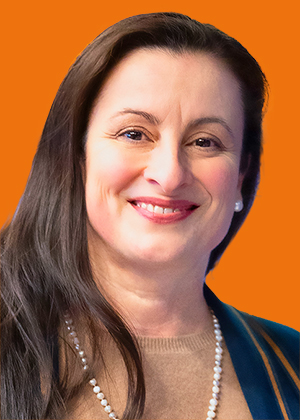
Chiara Tamburini
Head of Equality, Inclusion and Diversity Unit
What does it really mean to guarantee a better workplace for all women?
Firstly, ‘better’ means fair. At Parliament, we are doing everything in our power to ensure that women have equal career development opportunities. We do not rely solely on the formal statement of equality in Article 1d of the Staff Regulations, but on concrete measures to guarantee real equity. As an example, we strive to eliminate gender bias in recruitment interviews through training, statistical tools and the choice of words in vacancy notices, etc.
‘Better’ also means inclusive. In the Directorate-General for Personnel, we are committed to taking an intersectional view of all matters relating to equality. In order to create conditions for all women to succeed at work, we must therefore consider possible disability status, racial or ethnic minority origin, gender identity, sexual orientation, etc. To improve the workplace, we must take into account the reality of women, their needs and their lives.
Lastly, ‘better’ means attractive. If women feel recognised and listened to in their workplace, they will not only want to continue working there, but will be motivated to perform better. They will also inspire other talented women and men. As a result, all employees and the whole institution benefit from well-designed gender-sensitive HR policies. A better workplace for all women is in fact a better workplace for everyone.
Role of the Equality, Inclusion and Diversity Unit (EIDU) in the field of gender
The EIDU is based within the Directorate for HR Support and Social Services in DG Personnel and has a central coordination role in ensuring the full implementation of the gender roadmap. It has assisted the High-Level Group on gender mainstreaming throughout the process of developing the roadmap, carrying out consultations with the relevant parties and preparing drafts. It organises regular meetings with the gender coordinators from across the DGs in view of the implementation of the roadmap and liaises bilaterally with the key parties involved.
The EIDU works closely with the Vice-President of the European Parliament, Dimitrios Papadimoulis, to assist him in his numerous outreach activities and engagements related to gender equality and diversity, which are part of his responsibilities as Vice-President.
As well as its annual flagship brochure entitled ‘Women in the European Parliament’, the EIDU also publishes a gender observatory once a year to provide an update of the key statistics at both political and administrative levels. It also organises events to mark International Women’s Day each year and provides thematic training sessions to Parliament staff, including managers. It raises awareness of gender issues through articles on the intranet, Newshound and podcasts.
Equality and diversity coordinators and gender coordinators
The equality and diversity coordinators are representatives from each Directorate-General, with whom the Equality, Inclusion and Diversity Unit (EIDU) liaises on all matters related to equality, inclusion and diversity. The coordinators ensure close inter-service coordination on all thematic activities in the Secretariat of the European Parliament.
Each Directorate-General and each political group has appointed a coordinator to ensure the smooth implementation of the actions contained in the gender roadmap.
Both networks are chaired by the EIDU.
Committee on Equal Opportunities and Diversity (COPEC)
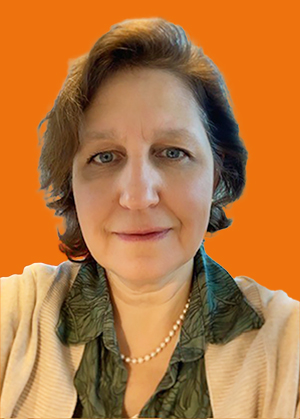
Elke Ballon
Chair
The COPEC's eight members and Chair are proposed by the Director-General for Personnel and the Staff Committee, and are subsequently appointed by the Appointing Authority. The COPEC aims to promote a tolerant and inclusive working environment, through participation in awareness-raising events and other activities. The COPEC proposes actions to ensure non-discrimination, issues opinions on rules stemming from the Staff Regulations, and monitors the proper implementation of measures taken, in particular by sending observers to sit on various advisory committees.
Staff Committee
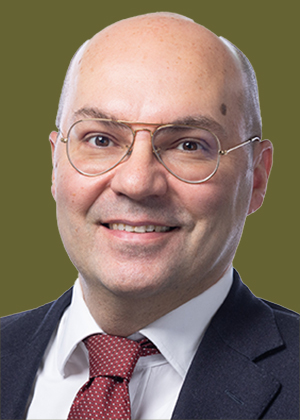
Pasquale Ciuffreda
Chair
The Staff Committee is firmly committed to achieving equal opportunities for ALL colleagues in the European Parliament. Fostering equal opportunities in the European public service is not just a pursuit of justice; it is an investment in excellence! As elected members representing the totality of Parliament’s staff, we congratulate all the colleagues who have been appointed to management and middle management positions in the past year. We are pleased to note that many of those appointed are women, resulting in a significant increase in the number of women managers. Parliament’s administration has made great progress towards offering more in-house career and training opportunities to women. As for the representation of the staff itself, the current Staff Committee Bureau is gender-balanced. Moreover, 38% of the 29 elected members of the Staff Committee are women. As regards staff committee representatives appointed to the professional delegations, advisory committees and bodies, we have attained an almost perfect gender-balanced representation with 49% of women. The Staff Committee will continue to lead by example, to actively support and encourage equal opportunity policies within our institution.


